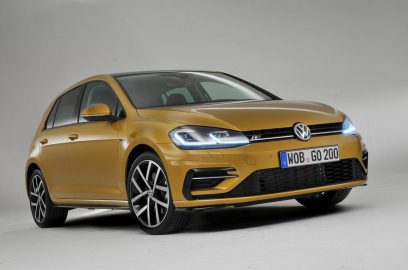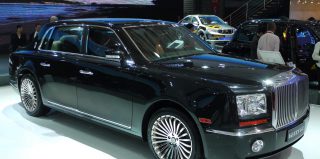Woman dies in 20-car pile-up on A40 as cold weather alert issued A acute drop in temperatures has prompted Public Health England to send outs its most serious cold weather alert of the winter so far, warning conditions are severe enough to endanger the elderly. Forecasters have also issued a severe weather warning as the […]
At least twelve dead, forty eight injured in terror attack on Berlin Christmas market
Suspect arrested, dead man found in cabin as ISIS takes credit for the attack
Monday, December Nineteen, two thousand sixteen
BERLIN – Bloody scenes of carnage and mayhem once again played out on the streets of Western Europe, this time targeting holiday revelers attending one of Germany’s renowned Christmas markets in the heart of Berlin.
Evoking pictures from the deadly Bastille Day attack earlier this year in Nice, France, a stolen Scania trailer truck barreled through the Breitscheidplatz city square in the German capital, mowing down dozens of civilians attending the popular holiday market in an attack U.S. and German officials both characterized as an act of terrorism.
German authorities took the suspected driver into custody shortly after the rampage came to an end near the landmark Kaiser Wilhelm Church in central Berlin, but not before, according to Berlin police, the driver had killed at least twelve people and injured forty eight others.
German officers also discovered another individual dead inwards the cabin of the truck, which had Grind license plates, but it remains unclear what, if any, role that person played in the attack.
According to reports in several German media outlets, the dead man in the cabin was its registered Grind driver, who may have been killed before the hijacked 7-ton semi went barreling through the market.
Berlin and German newspapers reported that the arrested man was a refugee from the Middle East who came to Germany earlier this year, albeit reports varied on whether he was Afghan or Pakistani.
Tourist Oleg Butkovsky, who was on holiday in Berlin, was on his way to the holiday market in west Berlin just as the attack happened.
“I come from Israel, and you always hear about how dangerous it is there, but this is the very first attack I’ve ever been near. It’s my very first day in Berlin,” Mr. Butkovsky said.
The Christmas market attack, coming on a day when Russia’s ambassador to Turkey was assassinated and gunfire erupted at a Swiss mosque, was a stark reminder of the threat of international terrorism and the security challenges awaiting U.S. President-elect Donald Trump when he takes office next month.
“We have been in touch with German officials, and we stand ready to provide assistance as they recover from and investigate this horrific incident,” said National Security Council spokesman Ned Price, noting the White House was treating the incident as a terrorist attack. “Germany is one of our closest playmates and strongest allies, and we stand together with Berlin in the fight against all those who target our way of life and menace our societies.”
Mr. Trump issued a far stronger statement, placing the responsibility for the “horrifying” attack squarely on Islamic terror groups.
“ISIS and other Islamic terrorists continuously slaughter Christians in their communities and places of idolize as part of their global jihad,” Mr. Trump said in a statement, using an acronymn for the Islamic State terror group. “These terrorists and their regional and worldwide networks must be eradicated from the face of the earth, a mission we will carry out with all freedom-loving playmates.”
Sources within German intelligence told CNN on Monday that officials investigating the Berlin attack were also characterizing the incident as an act of terror. Federal prosecutors, who treat terrorism cases, took over the investigation, German Justice Minister Heiko Maas told reporters.
A report in the German newspaper Die Welt tentatively identified the main suspect as a Pakistani refugee who arrived in Germany in February – a deeply problematic finding for German Chancellor Angela Merkel, who has already paid a strenuous political price for her initial open-arms welcome to Middle East refugees in two thousand fourteen and 2015, a policy she has since reversed amid soaring security concerns here.
Already, members of Germany’s surging right-wing parties were blaming the government in part for creating the environment that permitted the attack to take place.
Marcus Pretzell, a prominent member of the anti-migration, far-right Alternative for Germany party, lashed out at Ms. Merkel’s government, telling on Twitter: “When will the German state of law strike back? When will this cursed hypocrisy eventually stop? These are Merkel’s dead!”
The Grind holder of the truck said he feared the vehicle, driven by his cousin, may have been hijacked. Ariel Zurawki said he last spoke with the driver around noon, and the driver told him he was in Berlin and scheduled to unload Tuesday morning. “They must have done something to my driver,” he told TVN24.
But the Islamic State did not officially and instantly claim responsibility for the Berlin attack, as the group did for similar attacks in Nice in July or the Ohio State attack in November.
Abdul Razak Ali Artan, an Ohio State student, injured eleven people after driving his car into a cluster of students and proceeded to stab others before being killed by campus police.
Using cars and trucks as weapons to kill or maim as many people as possible is the low-tech mechanism now being touted by both Islamic State and al Qaeda to their sympathizers and would-be terrorists to carry out so-called “lone wolf” attacks in the U.S. and Europe. That was evidently the inspiration behind the Nice attack in July.
Officials from the Iraqi Popular Mobilization Coerces claim Islamic State has taken credit for the attack, citing unverified posts on messaging accounts on the group’s encrypted “Telegraph” mobile app tracked by Baghdad. But social media posts form the terror group’s online propaganda wing, known as Amaq News Agency, have yet to claim official credit.
The attack, the very first mass casualty attack in Germany after similar events had struck France, Belgium and other Western European countries, has sent shock swings through the country and the European Union.
Emergency vehicles encircled the wooden booths of the Christmas market at the foot of the bombed-out Kaiser Wilhelm Memorial Church, left in ruins after World War II. Hours after the incident, people waited at police barricades for answers, while others attempted to locate missing loved ones or just attempt to get their cars. Some tourists with shopping bags continued to arrive at the market before learning what happened, turning away shocked.
Witnessing the scene, local resident Bruno Jansen, 44, said it “was only a matter of time before something like this happened in Berlin.”
“I still feel safe in my city, but you have to be alert during these times,” he said.
Just hours before, tourists had jammed the narrow side streets and main pedestrian square of Breitscheidplatz, browsing holiday stalls selling everything from the Christmas staple of “Lebkuchen” gingerbread cookies and mulled wine to holiday ornaments and trinkets, when the truck smashed into the crowd.
Christmas markets are an iconic feature of the holiday season in Germany and Austria, drawing thousands of locals and tourists in the run-up to Christmas Day.
Toumas Tammas, a 21-year old tourist from Finland, was at the market just before the attack.
“I was visiting the Christmas market with my father an hour ago. We went for dinner across the street when we heard screaming, then the sirens came,” Mr. Tammas told The Washington Times. “We still don’t fairly know what happened.”
Val Junga, 25, was passing home on his way from the gym when he witnessed the scene, roads blocked and sirens and flashing lights at the square: “It’s so scaring to have this happen in Berlin, especially at this time of year,” he said.
The truck, which was loaded with steel bars, came to a halt on a sidewalk on one side of the market, according to The Associated Press. It had just rammed a large stand called “Fascination Christmas,” tearing off one side and knocking down a large Christmas tree. Dozens of people were on the ground as police vehicles began to arrive shortly after nine p.m., witnesses said.
Some Germans resolved not to be switched by the terror attack in the heart of their capital. But others said switches were unavoidable.
Stephan Mayer, a member of the conservative Christian Social Union in the Bundestag, said that “with this supposed attack on the Christmas market in Berlin, our worst fears have come true. Now the safety design of every Christmas market in Germany has to be examined – even to the point where we ask ourselves whether they can even still take place.”
• Carlo Munoz reported from Washington. Staff writers Dave Boyer and Victor Morton also contributed from Washington, and Austin Davis reported from Berlin. This article was also based in part on wire service reports.
Copyright © two thousand seventeen The Washington Times, LLC.



